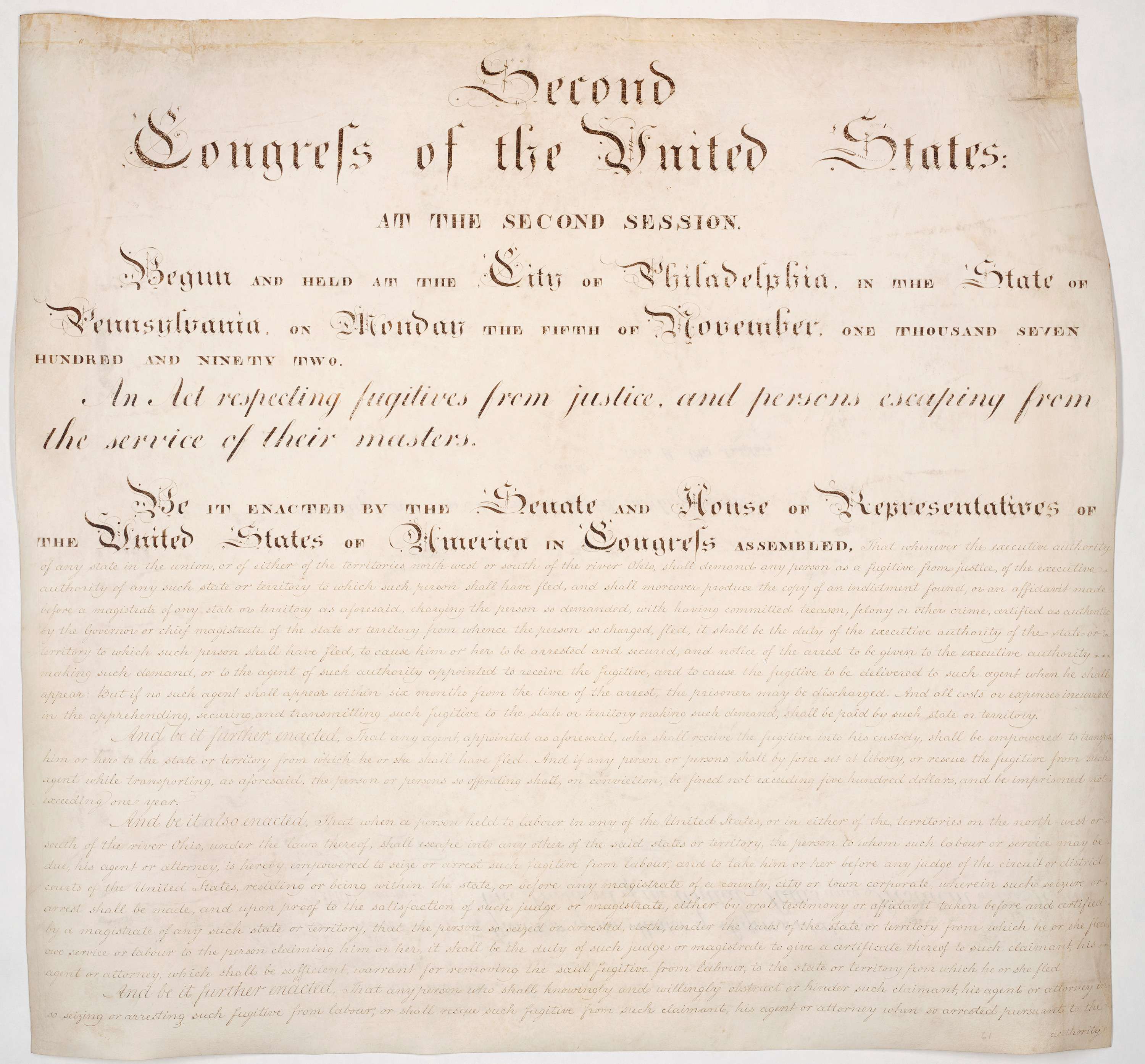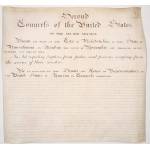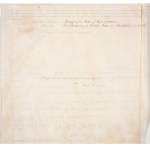Fugitive Slave Act of 1793
2/12/1793
Add to Favorites:
Add all page(s) of this document to activity:

Add only page 1 to activity:
Add only page 2 to activity:
The United States passed this law, its first fugitive slave law, in 1793. It gave owners of escaped slaves the right to reclaim them:
It was approved on February 12, 1793, and signed into law by President George Washington. It was later strengthened by the Fugitive Slave Act of 1850, which required the return of slaves who fled their masters.
...when a person held to labor in any of the United States...shall escape into any other part of the said States or Territory, the person to whom such labor or service may be due, his agent or attorney, is hereby empowered to seize or arrest such fugitive from labor, and to take him or her before any Judge of the Circuit or District Courts of the United States...and upon proof to the satisfaction of such Judge or magistrate...that the person so seized or arrested, doth, under the laws of the State or Territory from which he or she fled, owe service or labor to the person claiming him or her, it shall be the duty of such Judge or magistrate to give a certificate thereof to such claimant, his agent, or attorney, which shall be sufficient warrant for removing the said fugitive from labor to the State or Territory from which he or she fled.It was a response to a conflict between Virginia and Pennsylvania over the kidnapping of John Davis. Governor Mifflin of Pennsylvania claimed Davis was free. This law got rid of the conflict and made it legal for fugitive slaves to be captured in the north and returned to their masters. It also made it illegal for northerners to help a runaway slave.
It was approved on February 12, 1793, and signed into law by President George Washington. It was later strengthened by the Fugitive Slave Act of 1850, which required the return of slaves who fled their masters.
Transcript
Second
Congress of the United States:
AT THE SECOND SESSION.
Begun and held at the City of Philadelphia. In the State of Pennsylvania on Monday the fifth of November one thousand seven hundred and ninety two.
An Act respecting fugitives from justice, and persons escaping from the service of their masters.
Be it enacted by the Senate and House of Representatives of the United States of America in Congress assembled,
that whenever the executive authority of any state in the union, or of either of the territories north-west or south of the river Ohio, shall demand any person as a fugitive from justice, of the executive authority of any such state or territory to which such person shall have fled, and shall moreover produce the copy of an indictment found, or an affidavit made before a magistrate of any state or territory as aforesaid, changing the person so demanded, with having committed treason, felony or other crime, certified as authentic by the governor or chief magistrate of the state or territory from whence the person so charged, fled, it shall be the duty of the executive authority of the state or territory to which such person shall have fled to cause him or her to be arrested and secured, and notice of the arrest to be given to the executive authority... making such demand, or to the agent of such authority appointed to receive the fugitive, and to cause the fugitive to be delivered to such agent when he shall appear: But if no such agent shall appear within six months from the time of the arrest, the prisoner may be discharged. And all costs or expenses incurred in the apprehending, securing, and transmitting such fugitive to the state or territory making such demand, shall be paid by such state or territory.
And be it further enacted, that any agent, appointed as aforesaid, who shall receive the fugitive into his custody, shall be empowered to transport him or her to the state or territory from which he or she shall have fled. And if any person or persons shall by force set at liberty, or rescue the fugitive from such agent while transporting, as aforesaid, the person or persons so offending shall, on conviction, be fined not exceeding five hundred dollars, and be imprisoned not exceeding one year.
And be it also enacted, that when a person held to labour in any of the United States, or in either of the territories on the north west or south of the river Ohio, under the laws thereof, shall escape into any other of the said states or territory, the person to whom such labour or service may be due, his agent or attorney, is hereby empowered to seize or arrest such fugitive from labour, and to take him or her before any judge of the circuit or district courts of the United States, residing or being within the state, or before any magistrate of a county, city, or town corporate, wherein such seizure or arrest shall be made, and upon proof to the satisfaction of such judge or magistrate, either by oral testimony or affidavit taken before and certified by a magistrate of any such state or territory, that the person so seized or arrested, doth, under the laws of the state or territory from which he or she fled, owe service or labour to the person claiming him or her, it shall be the duty of such judge or magistrate to give a certificate thereof to such claimant, his agent or attorney, which shall be sufficient, warrant for removing the said fugitive from labour, to the state or territory from which he or she fled
And be it further enacted, that any person who shall knowingly and willingly obstruct or hinder such claimant, his agent or attorney in so seizing or arresting such fugitive from labour, or shall rescue such fugitive form such claimant, his agent or attorney when so arrested pursuant to the authority herein given or declared; or shall harbour or conceal such person after notice that he or she was a fugitive from labour, as aforesaid, shall, for either of the said offences, forfeit and pay the sum of five hundred dollars. Which penalty may be recovered by and for the benefit of such claimant, by action of debt, in any court proper to try the same; serving moreover to the person claiming such labour or service, his right of action or an account of the said injuries, or either of them.
Johnathan Trumbull, Speaker of the House of Representatives.
John Adams, Vice President of the United States and President of the Senate.
Approved February
Twelfth 1793. G. Washington. President of the United States.
I certify that this Act did originate in the Senate.
Attest, Sam A. Otis Secretary
This primary source comes from the General Records of the United States Government.
National Archives Identifier: 124068301
Full Citation: An Act Respecting Fugitives from Justice, and Persons Escaping from the Service of their Masters; 2/12/1793; Public Law, 2nd Congress, 2nd Session: Re Escapees from Justice and Masters, February 12, 1793; Enrolled Acts and Resolutions of Congress, 1789 - 2011; General Records of the United States Government, Record Group 11; National Archives Building, Washington, DC. [Online Version, https://docsteach.org/documents/document/fugitive-slave-act-1793, April 19, 2024]Activities that use this document
- From Slavery to Juneteenth: Emancipation and Ending Enslavement
Created by the National Archives Education Team
Rights: Public Domain, Free of Known Copyright Restrictions. Learn more on our privacy and legal page.





